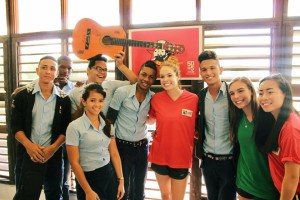Alexis Lowber ‘17 writes about her first hand experience in a Cuban high school outside the city of Cienfuegos. This January she traveled to Cuba for ten days with the J-Term group.

Alexis Lowber ’18: One of the most known aspects of senior year is its heavy involvement in the strenuous college process. As deadlines in November and January loomed, there emerged an air of anxiety and exhaustion as students scrambled to finish their personal essays, edit their supplements, take last-minute SATs or ACTs, schedule interviews, fill out financial aid forms, and visit colleges. After winter break, the college application process was finished, and it was in this relieved state of mind that I left for Cuba with my journalism group as EA began its fourth year of J-Term.
Eagerly anticipating our trip to a local high school in Cienfuegos, I wondered what it would be like to meet my fellow seniors from a foreign country. Upon arrival, it was very clear that this school differed greatly from the one I was used to. At first sight, the small, government-funded school exhibited no similarities to Episcopal. However, once we entered the building, the sight of blue uniforms, schoolroom desks, and workbooks evoked a sense of familiarity. We were welcomed by teachers and students from the school who sang us songs and read us a poem.
During the visit to the science classroom – which was clearly distinguishable by the specimens of animals preserved in jars, a periodic table painted on the wall, models of cells, and a terrarium – I engaged in conversation with the biology teacher about células eucariotas (eukaryotic cells) that brought me back to my junior year AP Biology class. While talking to the theater teacher, I recognized the same excitement and passion for art that can be observed in the faces of the faculty in EA’s arts office. In addition, I saw reflections of myself in a group of girls who explained their interest in biology and medicine.
While comparing this school in Cienfuegos to my own in Newtown Square, I began a mental list of the things that were very similar and very different, and I became curious to see on which side of the spectrum college applications would be placed. Through conversations with some 11th and 12th grade students, I found the process to be very different.
What stood out most to me was the paucity of requirements needed to apply. Cuban students simply needed to pass a single qualifying test, for which they have two attempts. (If students fail the qualifying test both times, they have to settle for a job that does not require a university degree). Admission to colleges – even the most elite institutions like La Universidad de la Habana (University of Havana) – is based solely on one’s scores. If students receive a certain score, they’re admitted. Exam scores determine entrance into college, not grades in school. No essays, no supplements, no FAFSA – because education is completely covered by the government. They only have to fill out a form stating the college of their choice and their major before they take their exams. There is not much flexibility with changing a major, unlike in America where students have the freedom to change majors multiple times throughout their four years in college. The students who perform best on their entry exams will get their preference of major.
However, other differences were visible as well. Most colleges in America offer financial aid packages to students, but this does not exist in Cuba. All education from elementary school through university is paid for by the government and as a result the literacy rate in Cuba is exceptionally high at 99.7%
Additionally, another recognizable difference between high school experiences lies in what students do in the year before college. While a majority of American students assimilate right into “college life,” all male Cuban students are required to serve in the military for one year before college. Women are given the option to serve in the military, and if they do they might be given a preference in major.
Thinking of the many hours of testing and writing that went into my own applications, I initially saw this simplified process as preferable to the complex system in America. That is, until I realized that it would be equivalent to submitting my SAT score as the sole representation of myself. There would be no statements of my academic passions or my hobbies, no essays about my aspirations or reasons for applying, nothing to distinguish me from the other applicants.